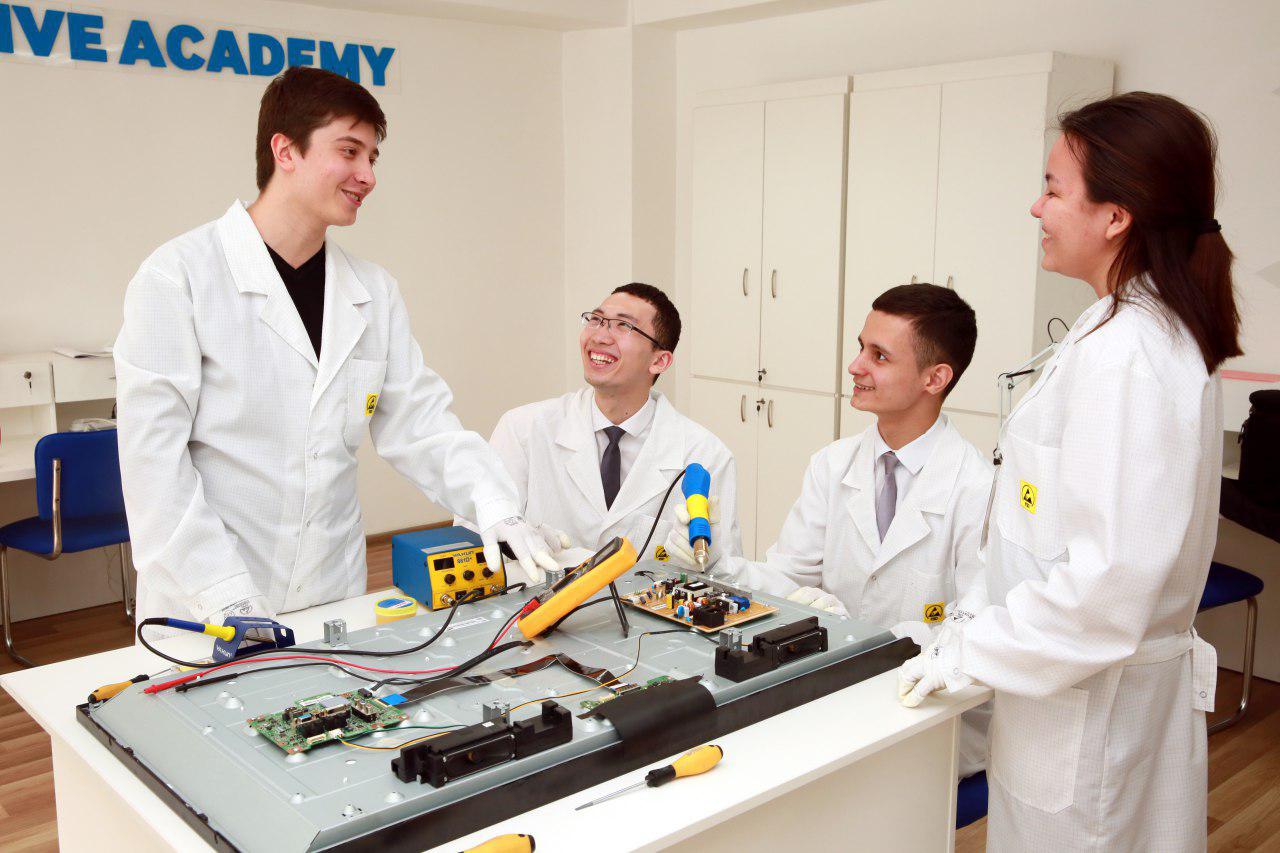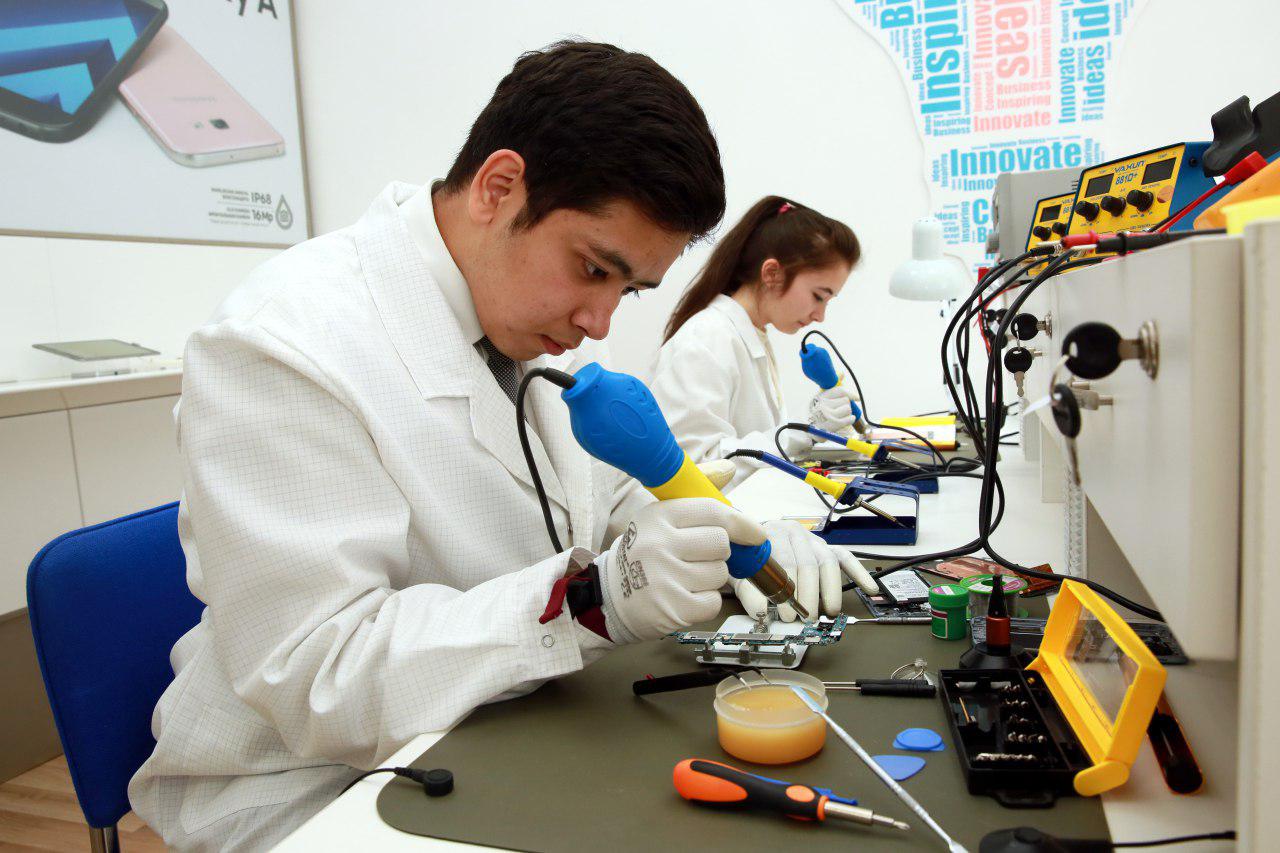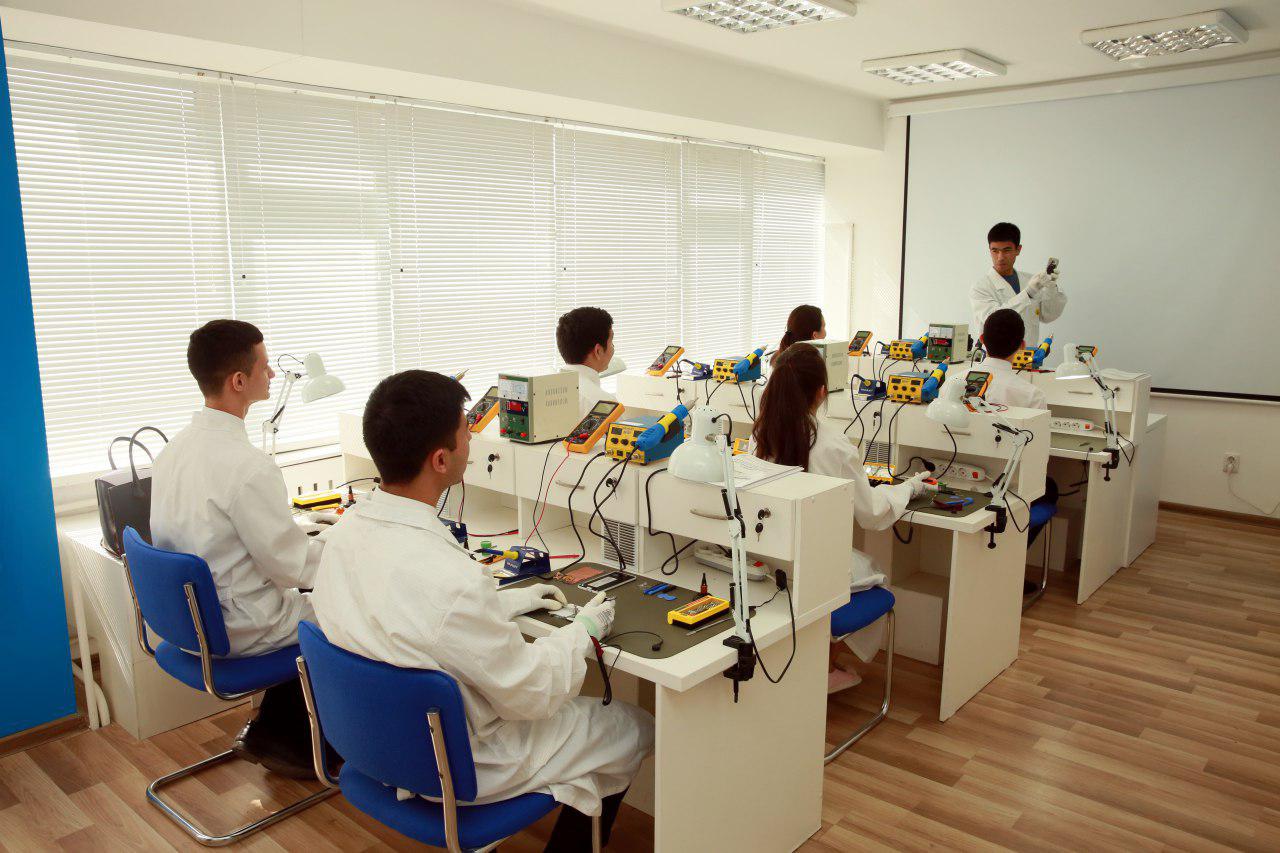

TASHKENT. The phase II of “Innovative Service Academy” project, implemented on the basis of the Tashkent Professional College of Information Technologies (TPCIT), has been completed. The final stage included retrofitting the academy’s laboratories for the repair of mobile phones and digital TVs with 18 modern soldering stations and expendable materials. Also, within the final phase, laboratories were provided with consumables for service maintenance of modern digital equipment for a year ahead.
We would like to remind that the first phase of “Innovative Service Academy” project was implemented in 2015, and later within three years the project was improved and took several stages of retrofitting and development. The Memorandum of Cooperation signed by the Tashkent Professional College of Information Technologies, Samsung Electronics Central Eurasia, as well as the Ecological Movement of Uzbekistan and the Regional Environmental Centre for Central Asia (CAREC) served as the basis for the implementation of this social and educational project. The task of the two latter organisations covered the promotion of “green” technologies, as well as participation in the preparation of modules and modern approaches to education.

Three years ago, TPCIT allocated the rooms for the equipment of two laboratories, a classroom and storage rooms, which enabled the Samsung Electronics Central Eurasia initiative to create an innovative academy, as well as introduce new courses on the repair of smartphones and digital TVs and environmentally oriented training modules in the program of vocational education.
“At the end of March 2018, the project was completed, but we are sure of the sustainability of its results. The technical and methodological bases that have been tested and developed over the years by joint efforts of the partners will allow the college to develop new specialities further and raise new specialists in the field of information and communication technologies which are in demand in the labour market of Uzbekistan.” Ms Tatyana Shakirova, CAREC Project Manager, says.
At the very beginning of the project, the head of Samsung Electronics Central Eurasia in Uzbekistan Mr Ming Shin Vung announced the socially-oriented message of the initiative: “We hope that participation in our program will allow young people to expand their basic knowledge and gain a significant competitive advantage in the labour market.”
Summary. What has “Innovative Service Academy” project given to the Tashkent Professional College of Information Technologies?

1. The project has allowed introducing new demanded specialities into the educational programme of TPCIT.
Initially, the college, which annually trains more than two thousand students and employs more than two hundred specialists, developed two main areas “Informatics and Information Technology” and “Telecommunications”, preparing specialists of the operation of communication and multimedia systems, software, repair and adjustment of computers and computer networks, operation and installation of transmission systems. Within “Innovative Service Academy” project, two new specialities appeared in the college, which were not taught by any educational institution of Uzbekistan: “Repairing of mobile phones” and “Digital TV service”.
Ms Tatyana Ovchinnikova, Deputy Director for Training and Production: “ During the academic year in “Innovative Service Academy”, second and third year students are allocated 60 hours for theory and 140 hours for practice on the specialty “Repair of digital TVs”, as well as another 60 hours for theory and 120 hours for practice in the specialty “Repair of mobile communication devices”. Methodological tools were developed for each course. If during the second course the focus is given more on assembling, disassembling of telephones and televisions, then the third courses are concentrated on a more in-depth program: diagnostics, troubleshooting, replacement of components, and more."
2. The project provided the college with a material and technical base for practical classes.
Two laboratories, an educational classroom and storage rooms were repaired and fully equipped. Mr Akmal Khashimov, teacher: “In our Academy students do not work on mock-ups and test cards, but with real mobile phones and digital TVs. For repair and diagnostics, we use digital measuring instruments, soldering stations, oscilloscopes and other modern tools that are used in well-equipped modern service centres.”
3. Project specialists presented a new approach to the world of technologies through the prism of environmental issues.
Within the framework of “Innovative Service Laboratory” project, great attention was paid to raising the awareness of teachers and students about “green” technologies. Mr Dmitriy Lee, TPCIT Director: “There is a repair component in studying program of the Academy, which, unlike modular repair, allows to substitute not a whole board, but only non-working elements. This is a painstaking work for a specialist, but it allows us to reduce the cost of repair work for the consumers of services by almost 90%. But the most important is the environmental component and concern for the future. After all, the recycling of non-working modules, no matter how technologically sophisticated it may be, has an impact on the environment. And each component repair reduces the utilisation by one unit.”
It should be noted that “Samsung Innovative Service Laboratory” project was implemented in Uzbekistan and Kazakhstan at the same time, that opened the possibilities for sharing the experience, effective solutions in the sphere of specialised secondary and vocational education.
Also in February 2018, a roundtable was held within the project in Tashkent with participation of specialists in the sphere of informational and communication technologies, representatives of the Ministry of Higher and Secondary Special Education of Uzbekistan, as well as the heads, teachers and students of TPCIT, the Tashkent Professional College of Radio Engineering and Automation, the Tashkent Professional College of Telecommunication Technologies, Mirzo-Ulugbek Professional College of Informatics, Yunusabad and Yashnabad Professional Colleges of Computer Technologies.
Addressing the representatives of specialised IT colleges during the roundtable, Mr Berik Umarov, representative of Samsung Electronics Central Eurasia said that the project is ready to share the methodology. The next day, on February 8, the following trainings were organised: “Training on Smartphone Repair Advanced Courses”, “Training on Television Repair Advanced Courses”, “Training on the Advanced Course on ‘Environmental Protection and Sustainable Development’”.
photos: Askar Yakubov
